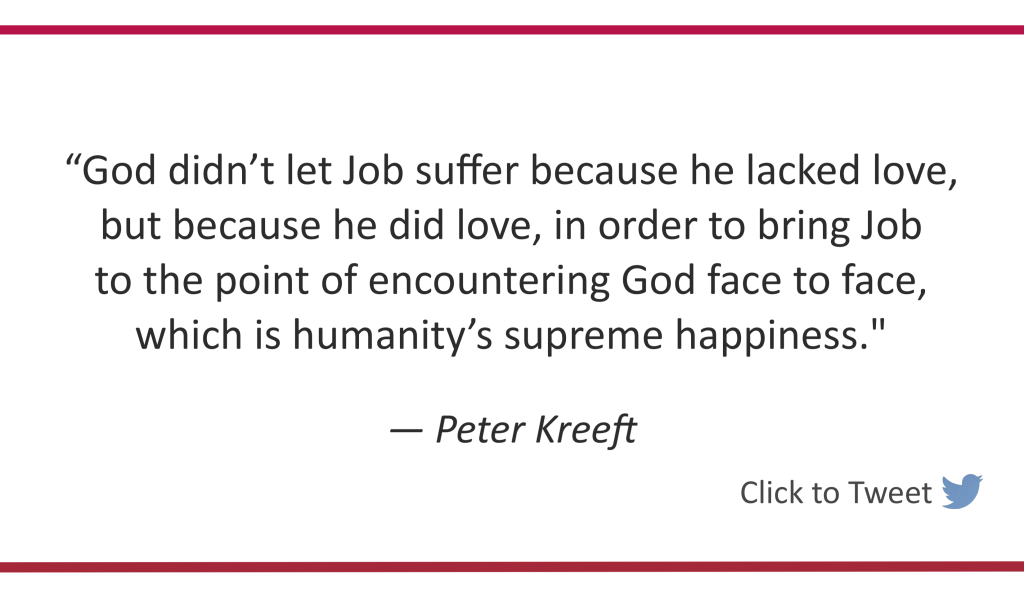The Problem of Pain: Is God a Cosmic Sadist?

Last night I spoke with a woman who is in deep despair. Years of endless suffering, chronic illness and abandonment by her family have left her completely disillusioned. “God could change all of this,” she said. “Why doesn’t He? I don’t understand…”
If we are completely honest, we might admit there is a circumstance in our lives causing us to ask the same question. It may be a minor frustration…or something that causes us to cry out in total despair like Job:
“My days have passed, my plans are shattered, and so are the desires of my heart” (Job 17:11).
Like Job, we may feel that life is hopeless. We may wonder why we should even continue on. Because Job was in a similar situation, the answer he found to the “why” question is enormously instructive.
Job’s Two Statements
Before God restored anything back to him, Job made two key statements:
1. You are sovereign.
“I know that you can do all things; no plan of yours can be thwarted” (Job 42:2).
In other words, Job said, “God, You are in charge. You are in control. This suffering was part of Your plan—Your best—for my life. You can do all things. If this had not been the best for my life, You would have allowed a different plan. No one, not even Satan, has authority over You, Your plan, or the working of the details of Your plan. I trust You.”
Job was at rest, at peace with God’s plan…before God gave anything back to him. “Why?” you might ask? Because he had experienced God like never before.
2. Because of my suffering, I now know You in unparalleled ways.
“My ears had heard of you but now my eyes have seen you” (Job 42:5, emphasis added).
The word for “seen” in the original language means: to feel, to experience, to learn, to reveal oneself, to ascertain, to make one feel or know, to cause to enjoy; to gain understanding, to be fully aware.
Can you imagine ascertaining the creator of the universe – the God who spoke the world into being? The One of whom is it written,
“By the word of the LORD were the heavens made, their starry host by the breath of his mouth. He gathers the waters of the sea into jars; he puts the deep into storehouses…For he spoke, and it came to be; he commanded, and it stood firm” (Psalm 33:6-9).
Can you imagine enjoying Him more? Understanding Him and His ways? Being more fully aware of what He is really like?
Because God Loved…
In The Case for Faith, Peter Kreeft describes this example we have in Job – this mirror image of what God is doing in our own lives through suffering:
Job was wondering who God was, because it looked as if God was a cosmic sadist. At the end of the book of Job…God finally shows up with the answer—and the answer is a question.
He says to Job, ‘Who are you? Are you God? Did you write this script? Were you there when I laid the foundations of the earth?’ And Job realizes the answer is no. Then he’s satisfied. Why? Because he sees God! God doesn’t write him a book. He could have written the best book on the problem of evil ever written. Instead, he shows himself to Job.
…Job gets a foretaste of heaven at the end of the book of Job, because he meets God. If it were only words that God gave him, that would mean that God would give a good answer and Job would aks another question the next day and the next day, because Job was a very demanding philosopher. This would go on and on and never end. What could make it end? God’s presence!
God didn’t let Job suffer because he lacked love, but because he did love, in order to bring Job to the point of encountering God face to face, which is humanity’s supreme happiness. Job’s suffering hollowed out a big space in him so that God and joy could fill it.
As we look at human relationships, what we see is that lovers don’t want explanations, but presence. And what God is, essentially, is presence—the doctrine of the Trinity says God is three persons who are present to each other in perfect knowledge and perfect love. That’s why God is infinite joy. And insofar as we can participate in that presence, we too have infinity joy. So that’s what Job has—even on his dung heap, even before he gets any of his worldly goods back—once he sees God face to face.[1]
Satisfied Before
Job was completely satisfied before God gave anything material or physical back to him. He was satisfied because He had seen God.

The place we find God and “see” Him is in His word, the Bible.
“Open my eyes that I may see wonderful things in your law” (Psalm 119:18).
I believe this is why the psalmist came to treasure God’s word so deeply during affliction.
“It was good for me to be afflicted so that I might learn your decrees. The law from your mouth is more precious to me than thousands of pieces of silver and gold. (119:71-72)
May those who fear you rejoice when they see me, for I have put my hope in your word. I know, O LORD, that your laws are righteous and in faithfulness you have afflicted me. (v. 74-75)
If your law had not been my delight, I would have perished in my affliction.” (v 92).
Questions:
- Has it occurred to you that your supreme happiness is not found in the measure of your health or wealth—it’s found in your face-to-face encounter with God?
- Have you considered that your suffering is merely hollowing out a big space in you so that God and joy can fill it?
- Do you want your suffering to cause you to know God in unparalleled ways?
- Are you going to God’s word daily? Are you letting it be your life, strength, and perspective? Are you abiding in it, meditating on it, receiving its power so much so that it has become more precious to you than silver and gold?
- Are you asking God to open your eyes that you might see wonderful things in His word?
RELATED ARTICLES:
- Finding Contentment and Thanksgiving in Suffering, Part 1
- Finding Contentment and Thanksgiving in Suffering, Part 2
- His Throne Rules Over All: Resting in God’s Sovereign Rule, Part One
- Filtered Through His Fingers of Love: Resting in God’s Sovereign Rule, Part Two
- Seesaw Control: How Perspective Draws Victory from Defeat: Resting in God’s Sovereign Rule, Part Four
- Do God and Satan Alternate Shifts? Resting in God’s Sovereign Rule, Part Five
- Overcoming Adversity 101, Part 5: Is God Good and Loving?
- Pure Joy: Three reasons to rest and rejoice in affliction
- Boundless Strength, Eternal Joy
- The Resurrected Life
_________________________
- Lee Strobel, The Case for Faith, (Grand Rapids, MI: Zondervan, 2000), 69-70

Disclosure of Material Connection: Some of the links in the post above are “affiliate links.” This means if you click on the link and purchase the item, Shades of Grace will receive an affiliate commission. Regardless, I only recommend products or services I use personally and believe will add value to my readers. I am disclosing this in accordance with the Federal Trade Commission’s 16 CFR, Part 255 “Guides Concerning the Use of Endorsements and Testimonials in Advertising.”







 “Natalie Grace Nichols is experiencing God’s grace and freely expressing it. My wife, Betty, and I thank God for the ministry of Jesus through Natalie.”
“Natalie Grace Nichols is experiencing God’s grace and freely expressing it. My wife, Betty, and I thank God for the ministry of Jesus through Natalie.” “I’m so thankful that God is raising up women like Natalie for a new generation, providing biblically balanced teaching, encouragement, and comfort for people who are enduring life’s trials.”
“I’m so thankful that God is raising up women like Natalie for a new generation, providing biblically balanced teaching, encouragement, and comfort for people who are enduring life’s trials.”
[…] is why I say that the most priceless treasure I’ve ever received was the gift of knowing Jesus more intimately—literally existing by His life—because of the trial I went […]